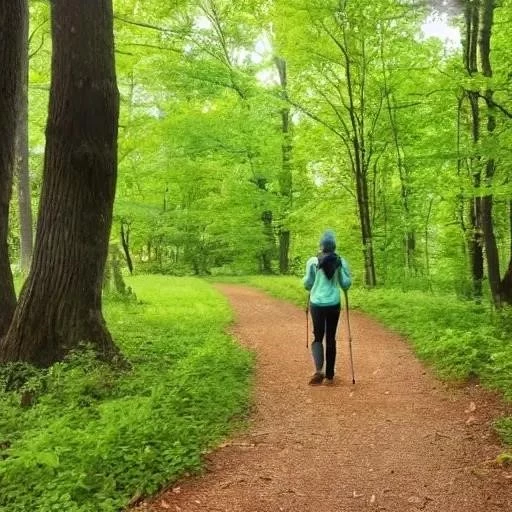In an increasingly digitized world, where screens often dominate our daily existence, a profound yearning for nature’s embrace has emerged, beckoning us to rediscover the simple yet incredibly potent joys of the great outdoors. Beyond merely a leisure activity, hiking stands as a remarkably accessible and profoundly transformative practice, offering an unparalleled spectrum of benefits that touch every facet of human well-being. From invigorating our physical bodies to calming our restless minds and nourishing our very spirits, the act of placing one foot in front of the other on a winding trail is proving to be a revolutionary antidote to the modern malaise, a powerful prescription written by Mother Nature herself.
Indeed, the allure of the wilderness is not just a romantic notion; it is deeply rooted in scientific evidence and anecdotal wisdom accumulated over millennia. Embarking on a hike, whether a gentle stroll through local woodlands or a challenging ascent up a formidable peak, immediately initiates a cascade of positive physiological and psychological responses. Our senses awaken, our breath deepens, and the rhythmic motion of walking harmonizes with the natural world, fostering a sense of belonging and profound connection that many find increasingly elusive in urban environments. This isn’t just exercise; it’s an immersion, a reset, a powerful journey of self-discovery unfolding with every single step.
For those considering integrating this incredible activity into their lives, or for seasoned trekkers seeking a deeper appreciation, here’s a comprehensive look at the multifaceted advantages awaiting you on the trail:
| Benefit Category | Key Advantages | Impact & Reference |
|---|---|---|
| Physical Health | Improved cardiovascular fitness, stronger muscles and bones, weight management, enhanced balance and coordination, reduced risk of chronic diseases. | Boosts energy levels, increases longevity, strengthens immune system. National Park Service |
| Mental Well-being | Stress reduction, mood enhancement, improved cognitive function, reduced anxiety and depression, increased creativity. | Fosters mindfulness, provides mental clarity, promotes emotional resilience. American Psychological Association |
| Emotional & Spiritual Growth | Deepens connection with nature, offers perspective, cultivates gratitude, builds self-esteem and confidence through overcoming challenges. | Encourages introspection, develops a sense of achievement, inspires awe and wonder. |
| Social Engagement | Opportunities for group activities, fostering community, shared experiences and bonding with friends and family. | Strengthens relationships, creates lasting memories, expands social circles. |
| Practical Tips for Beginners | Start small, proper footwear, carry water and snacks, check weather, inform someone of your route, pack a map/GPS. | Ensures safety and enjoyment, gradually builds stamina, makes hiking accessible and sustainable. |
The Undeniable Physical Fortification
From a purely physiological standpoint, hiking is an incredibly effective full-body workout. Traversing varied terrain—ascending inclines, navigating rocky paths, and descending gently sloping trails—engages a diverse array of muscle groups, far beyond what a flat treadmill can offer. Your quadriceps, hamstrings, glutes, and calves are constantly working, building strength and endurance, while your core muscles stabilize your body, improving balance and coordination. “It’s a fantastic cardiovascular exercise, strengthening your heart and lungs, reducing blood pressure, and significantly lowering the risk of heart disease and stroke,” explains Dr. Elena Petrova, a sports medicine physician at the Global Wellness Institute. Regularly participating in this dynamic activity also contributes to bone density, helping to ward off osteoporosis, a critical benefit often overlooked. The calorie expenditure can be substantial, making it an excellent tool for weight management, all while enjoying breathtaking natural scenery.
A Sanctuary for the Mind and Soul
Perhaps even more compelling are the profound impacts hiking has on mental and emotional well-being. In a world saturated with digital noise and constant demands, the trail offers a rare refuge, a chance to disconnect from technology and reconnect with oneself. Studies, including notable research published in the Proceedings of the National Academy of Sciences, have shown that spending time in nature can significantly reduce rumination—the repetitive negative thought patterns often associated with depression. The gentle rhythm of walking, combined with the sensory richness of the natural environment, fosters a state of mindfulness, pulling us into the present moment and away from anxieties about the past or future. The sights, sounds, and even smells of the forest act as a powerful stress reliever, demonstrably lowering cortisol levels and promoting a sense of calm.
Furthermore, the sense of accomplishment derived from completing a challenging hike can be incredibly empowering, boosting self-esteem and resilience. Overcoming obstacles, whether a steep climb or an unexpected stream crossing, builds confidence and a profound appreciation for one’s own capabilities. This connection to something larger than ourselves, to the ancient rhythms of the earth, often provides a deep spiritual nourishment, inspiring awe and a renewed sense of purpose. As famed naturalist John Muir eloquently stated, “In every walk with nature, one receives far more than he seeks.”
Forging Connections: Community and Conservation
Beyond individual benefits, hiking also fosters a vibrant sense of community and a deepened commitment to environmental stewardship. Group hikes offer fantastic opportunities for social interaction, building camaraderie as individuals share experiences, support each other, and forge lasting friendships amidst stunning backdrops. Organizations like the Appalachian Trail Conservancy and numerous local hiking clubs exemplify how shared passion for the outdoors can unite people, creating powerful networks dedicated to exploration and preservation. By actively engaging with natural landscapes, hikers often become passionate advocates for conservation, understanding firsthand the critical importance of protecting these precious environments for future generations. This symbiotic relationship—nature giving us health, and us giving nature our protection—underscores the forward-looking vision of a more sustainable and harmonious future.
Embracing the Future, One Step at a Time
Looking ahead, the role of hiking as a cornerstone of public health and personal well-being is only set to grow. With increasing awareness of the detriments of sedentary lifestyles and chronic stress, more individuals and even healthcare providers are turning to nature-based therapies. Forward-thinking urban planners are integrating green spaces and accessible trails into city designs, recognizing their invaluable contribution to community health. The future of wellness isn’t confined to sterile gyms; it’s unfolding on sun-dappled trails, beside rushing rivers, and atop panoramic peaks.
So, whether you’re a seasoned mountaineer or someone merely contemplating their first venture into the wild, the invitation is clear: lace up your boots, step outside, and allow the ancient, restorative power of hiking to transform your life. The path to a healthier, happier, and more connected existence is literally waiting, one inspiring step at a time. The remarkable benefits are undeniable, offering a vibrant, optimistic vision for a future where personal wellness and environmental harmony walk hand-in-hand.






